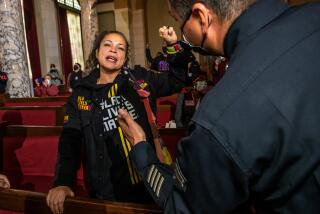Justices Wary of Suing Police for Inaction
- Share via
WASHINGTON — The Supreme Court gave a skeptical hearing Monday to a woman’s claim that police can be sued if they failed to enforce a protective order designed to shield her and her children from her estranged husband.
Six years ago, Jessica Gonzales of Castle Rock, Colo., lost her three daughters when her husband abducted them from her front yard and later shot them to death in his truck. He was killed when he fired at police.
Three times during the evening of the abduction, the mother called the Castle Rock police reporting that her girls were missing. She had obtained a protective order during her divorce proceeding that required her husband to stay away from her house. The order also said police “shall” use all reasonable means to protect her and her children.
The officer who took her calls did nothing, except tell her to call back in two hours if the girls did not reappear.
The Supreme Court took up her case to decide whether victims of such inaction by the police can sue and win monetary damages.
For most of the justices, the answer appeared to be no.
Justice Stephen G. Breyer said he feared that a ruling for Gonzales would open the door to numerous lawsuits against the police and other government agencies for failing to do their duty.
“The reason is they’re too busy,” he said. Plenty of laws impose a duty on the government, he noted, “but that doesn’t mean the victim has a right to enforce it” by suing, he added.
Justice Sandra Day O’Connor said she too was worried about allowing people to sue the police for not acting. Usually, the police are sued for taking actions, such as for using excessive force.
“This is such a new requirement you are seeking. It would be a major step,” O’Connor said.
Others pointed out that the police usually had wide discretion to decide which cases to pursue. “This is very much at odds with the normal discretion” given the police, Justice David H. Souter said.
The case of Castle Rock vs. Gonzales has attracted broad attention. Women’s rights groups and activists in the fight against domestic violence say protective orders are meaningless if police have no duty to act. And without the penalty of a lawsuit, they may choose to ignore these court orders, they say.
Gonzales’ lawyer said the Castle Rock police often did nothing to enforce protective orders.
“They had a pattern of ignoring these complaints,” Brian Reichel told the court. “She assumed she would be protected by the state. It means something only if the police were willing to enforce it.”
Police and municipal groups joined the case on the side of Castle Rock, as did Bush administration lawyers. They said federal courts should not allow lawsuits based on complaints that a government agency did not respond.
“What happened here is undeniably tragic,” said law professor John Eastman, an attorney representing Castle Rock, but a protective order does not create a constitutional entitlement to a speedy response from the police.
Eastman, who teaches at Chapman University Law School in Orange, said Colorado did not intend to create any such entitlement, and therefore officials did not violate the Constitution when they failed to respond to Gonzales’ calls.
Justice Antonin Scalia said he agreed, calling the claim “utterly zany.” Only justices Ruth Bader Ginsburg and John Paul Stevens sounded as though they were leaning in favor of Gonzales.
“Don’t the police have an obligation to enforce” the protective order? Ginsburg asked.
No, Eastman replied.
“Can they just ignore all orders of this kind?” Stevens asked. Yes, said a Bush administration lawyer, although the failure to act may lead to a suit in the state courts, he added.
The justices also heard arguments Monday on whether state prison officials must make special accommodations for the religious beliefs of inmates.
Five years ago, Congress passed a law designed to bolster religious freedom rights, but prison officials in Ohio are challenging the measure as unconstitutional in the case of Cutter vs. Wilkinson.
A ruling on both cases is expected by late June.
More to Read
Get the L.A. Times Politics newsletter
Deeply reported insights into legislation, politics and policy from Sacramento, Washington and beyond. In your inbox twice per week.
You may occasionally receive promotional content from the Los Angeles Times.











